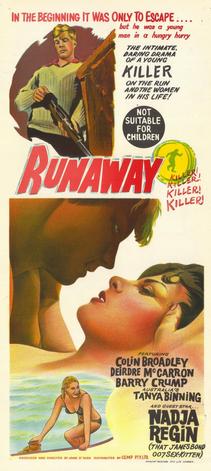Related Research Articles

Charles Patrick Ryan O'Neal is an American actor and former boxer. He trained as an amateur boxer before beginning his career in acting in 1960. In 1964, he landed the role of Rodney Harrington on the ABC nighttime soap opera Peyton Place. It was an instant hit and boosted O'Neal's career. He later found success in films, most notably in the romantic drama Love Story (1970), for which he was nominated for the Academy Award for Best Actor and the Golden Globe Award for Best Actor – Motion Picture Drama, Peter Bogdanovich's What's Up, Doc? (1972) and Paper Moon (1973), which earned him a nomination for the Golden Globe Award for Best Actor – Motion Picture Musical or Comedy, Stanley Kubrick's Barry Lyndon (1975), Richard Attenborough's A Bridge Too Far (1977), and Walter Hill's The Driver (1978). From 2005 to 2017, he had a recurring role in the Fox television series Bones as Max, the father of the show's protagonist.
Water Rats is an Australian TV police procedural broadcast on the Nine Network from 1996 to 2001. The series was based on the work of Sydney Water Police who fight crime around Sydney Harbour and surrounding locales. The show was set on and around Goat Island in Sydney Harbour.

Colin Friels is a Scottish-born Australian actor of theatre, TV, film and presenter.
Griffin Patrick O'Neal is an American actor. He has appeared in films such as The Escape Artist, April Fool's Day, The Wraith, Assault of the Killer Bimbos, and Ghoulies III.
The Scarecrow is a 1982 New Zealand film, also known as Klynham Summer in America. It was directed by Sam Pillsbury based on the 1963 horror novel by New Zealand author Ronald Hugh Morrieson.

Middle Age Spread is a 1979 film adaptation of the Roger Hall play of the same name.
Monkey Grip is a 1982 Australian drama film directed by Ken Cameron. It is based on the novel, also titled Monkey Grip (1977), by Helen Garner. It was screened in the Un Certain Regard section the 1982 Cannes Film Festival. The film was produced by Patricia Lovell and stars Noni Hazelhurst and Colin Friels, and featured an original soundtrack by Australian rock band the Divinyls.
On the Friendly Road is a 1936 film from New Zealand which told a story of New Zealand in the depression.

Down on the Farm is a 1935 New Zealand film. It was New Zealand's first sound feature.

Runaway, also called Runaway Killer, is a 1964 New Zealand made thriller film and a road movie. John O’Shea of Pacific Films produced, directed and co-wrote it. Shot in black and white and released on 35 mm and also 16 mm, it was cut to 80 minutes and renamed Runaway Killer for release in Britain, although this lost continuity between scenes. The film stars Colin Broadley in the lead, and several New Zealanders who became famous in other fields; Kiri Te Kanawa, Barry Crump and Ray Columbus.
The Romance of Maoriland was a 1930 New Zealand film, intended to be New Zealand's first "talkie" film with Ted Coubray’s Coubraytone sound system, though also having intertitles. The film was registered with the Chief Censor on 14 August 1930, but was never released.
The River Wanganui is a 1913 documentary shot in New Zealand in 1912 on the 1912–13 South Pacific film-making voyage of French director Gaston Méliès. Like many of his films shot on that trip, it is now lost.
Bread and Roses is a 1993 biographical film showing significant episodes in the political life of socialist and feminist Sonja Davies, based on her autobiography of the same name. She is portrayed from her early years to her election to the Nelson Hospital Board. Made as a Suffrage Year tribute to the women of New Zealand. Helen Martin says the film is fascinating as a social history, showing her empathy with working class women. The film was shown on television in four episodes in October 1993.
Lee M. Hill full name Leighton McLeod Hill was a New Zealand film-maker and cinematographer. He was born in Carterton, attended Carterton School and Dannevirke High School, and died in Wellington.
Judy Coralyn Sylvia Callingham is a New Zealand scriptwriter, television presenter and journalist. Since the 1970s she has worked on numerous New Zealand television dramas including Close to Home, Homeward Bound, Duggan and Marlin Bay. She is a former deputy chair of NZ On Air, and together with her husband Brian Edwards runs a media training consultancy company.

Michael Haigh was a New Zealand actor, narrator and teacher.
Landfall is a 1975 New Zealand film directed by Paul Maunder. The film was first shown at the 1977 Wellington Film Festival.
The Last Tattoo is a 1994 feature film set in World War II, Wellington, New Zealand.
Mark II is a 1986 New Zealand made drama written by Mike Walker and directed by John Anderson.
References
- 1 2 3 Martin, Helen; Edwards, Sam (1997). New Zealand Film, 1912-1996. Oxford University Press. p. 86. ISBN 9780195583366.
- ↑ "Prisoners (1982)". British Film Institute. Archived from the original on 9 August 2019. Retrieved 9 August 2019.
- ↑ Churchman, Geoffrey B., ed. (1997). Celluloid Dreams: a century of film in New Zealand. Wellington: IPL Books. p. 111. ISBN 9780908876969.
- ↑ "Prisoners". Nga Taonga – Sound & Vision. New Zealand Archive of Film, Television and Sound. Retrieved 9 August 2019.
- ↑ Ed. Scott Murray, Australia on the Small Screen 1970-1995, Oxford University Press, 1996 p125
- ↑ Thomas, Bob (15 June 1982). "Tatum Ready for Stardom". The Journal News. New York – via Newspapers.com.